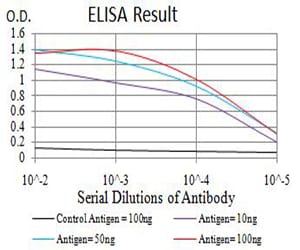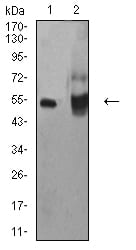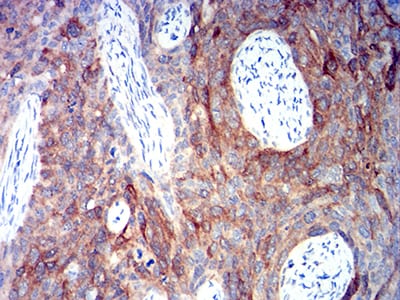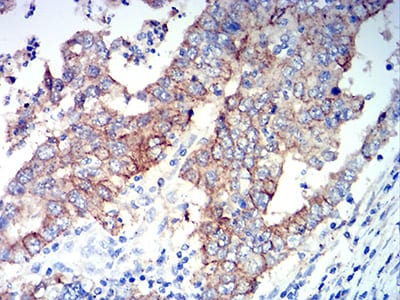



| WB | 1/500 - 1/2000 | Human,Mouse,Rat |
| IF | 咨询技术 | Human,Mouse,Rat |
| IHC | 1/200 - 1/1000 | Human,Mouse,Rat |
| ICC | 技术咨询 | Human,Mouse,Rat |
| FCM | 咨询技术 | Human,Mouse,Rat |
| Elisa | 1/10000 | Human,Mouse,Rat |
| Aliases | ALDC; ALDH1; HEL-9; HEL12; PUMB1; ALDH11; RALDH1; ALDH-E1; HEL-S-53e |
| Entrez GeneID | 216 |
| clone | 2G1G4 |
| WB Predicted band size | 54.9kDa |
| Host/Isotype | Mouse IgG1 |
| Antibody Type | Primary antibody |
| Storage | Store at 4°C short term. Aliquot and store at -20°C long term. Avoid freeze/thaw cycles. |
| Species Reactivity | Human |
| Immunogen | Purified recombinant fragment of human ALDH1A1 (AA: 1-110) expressed in E. Coli. |
| Formulation | Purified antibody in PBS with 0.05% sodium azide |
+ +
以下是关于 **ALDH1A1抗体** 的3-4篇参考文献(简略版):
---
1. **文献名称**:*ALDH1 is a marker of normal and malignant human mammary stem cells and a predictor of poor clinical outcome*
**作者**:Ginestier C, et al.
**摘要**:研究利用ALDH1A1抗体检测其在乳腺癌干细胞中的高表达,发现ALDH1阳性细胞具有自我更新和成瘤能力,且ALDH1A1高表达与患者预后不良相关。
2. **文献名称**:*Aldehyde dehydrogenase activity of breast cancer stem cells is primarily due to isoform ALDH1A1 and its expression is predictive of metastasis*
**作者**:Marcato P, et al.
**摘要**:通过ALDH1A1抗体验证其在乳腺癌干细胞中的特异性表达,证明ALDH1A1活性促进肿瘤转移,并可作为治疗靶点。
3. **文献名称**:*ALDH1A1-positive cancer stem cells predict prognosis in lung adenocarcinoma*
**作者**:Tomita H, et al.
**摘要**:使用ALDH1A1抗体对肺癌组织进行免疫组化分析,发现其高表达与肿瘤耐药性及患者生存期缩短显著相关。
4. **文献名称**:*Targeting ALDH1A1 to treat cisplatin-resistant non-small cell lung cancer*
**作者**:Deng S, et al.
**摘要**:研究通过抑制ALDH1A1(抗体检测验证)逆转肺癌细胞对顺铂的耐药性,揭示其通过调控抗氧化通路介导耐药机制。
---
以上文献均涉及ALDH1A1抗体的实验应用(如免疫组化、流式分选等),并探讨其在肿瘤干细胞、预后及耐药性中的作用。如需具体期刊信息或年份,可进一步补充检索!
The ALDH1A1 antibody is a crucial tool in biomedical research, targeting aldehyde dehydrogenase 1 family member A1. an enzyme involved in cellular detoxification and metabolism. ALDH1A1 catalyzes the oxidation of retinaldehyde to retinoic acid, a key molecule in cell differentiation and development. It is highly expressed in stem cells and cancer stem cells (CSCs), where it contributes to drug resistance, tumor progression, and relapse, making it a biomarker of interest in oncology.
Researchers use ALDH1A1 antibodies to detect and quantify the enzyme’s expression in tissues or cells via techniques like Western blot, immunohistochemistry (IHC), and immunofluorescence (IF). These applications help elucidate its role in cellular processes, including oxidative stress response, stem cell maintenance, and cancer pathogenesis. The antibody’s specificity is validated using knockout controls or siRNA-mediated silencing to ensure accurate detection.
In cancer studies, ALDH1A1 expression correlates with poor prognosis in breast, lung, and ovarian cancers. Its antibody is also employed in isolating CSCs via fluorescence-activated cell sorting (FACS). Beyond oncology, ALDH1A1 is studied in metabolic disorders and neurodegenerative diseases due to its role in detoxifying reactive aldehydes.
Commercial ALDH1A1 antibodies are available as monoclonal or polyclonal variants, with validation data critical for reproducibility. Understanding its expression patterns aids in developing therapeutic strategies targeting ALDH1A1-positive cells, particularly in overcoming chemoresistance.
×